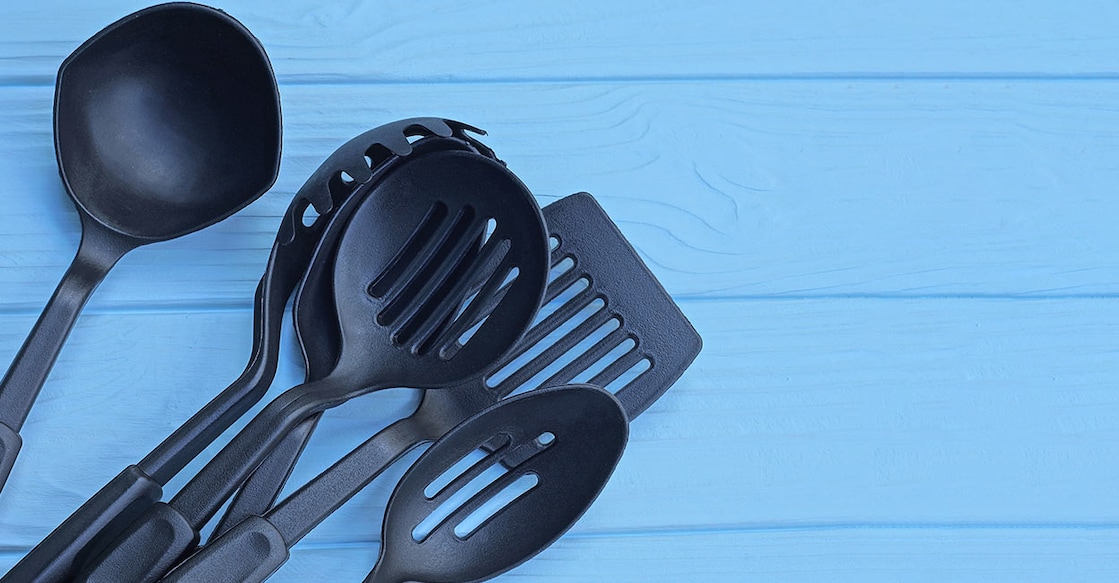Why your black plastic kitchen utensils might be toxic — and what to use instead

Mail This Article
Let’s be real—black plastic kitchen utensils look sleek and serve their purpose. But what if we told you that they might be secretly leaching toxic chemicals into your food? Yup, that’s right. It turns out, your favourite spatula or stirring spoon could be harbouring some unsavoury hidden ingredients, thanks to chemicals like flame retardants often found in black plastic.
Before you panic and throw your entire kitchen drawer away, don’t worry—we’ve got the lowdown on why you should consider ditching those black plastic utensils and what better (and safer) options are out there. The alternatives are not only healthier but also way cooler and more eco-friendly. Ready to upgrade your kitchen? Let’s dive in!
What’s the problem with black plastic utensils?
Many black plastic utensils are made from recycled electronic waste, such as old laptops or cell phones. A study published in Chemosphere found that 65% of tested black plastic products, including kitchen utensils, contained harmful chemicals like brominated and organophosphate flame retardants. These chemicals, often used to prevent fires in electronic products, have been linked to serious health concerns, including cancer, hormonedisruption and developmental issues.
While the study initially overstated the level of exposure to these chemicals due to a mathematical error, the corrected data still highlights the presence of toxic substances in black plastic utensils. The researchers emphasized that while the exposure may be lower than initially reported, the risk remains significant, especially with regular and prolonged use of these utensils at high temperatures.
Why you should switch to safer alternatives
Given the concerns surrounding black plastic utensils, experts recommend replacing them with safer materials. Here are some of the best alternatives:
1. Bamboo utensils
Bamboo utensils are made from a renewable, sustainable resource and do not contain toxic chemicals.
Benefits: Lightweight, antimicrobial, and eco-friendly.
Care tip: Similar to wooden utensils, avoid soaking bamboo in water to extend its lifespan.
Add to cart: USDA Certified Bamboo Cooking Utensils
2. Wooden utensils
Made from natural, non-toxic materials, wooden utensils do not leach harmful chemicals into food.
Benefits: Gentle on cookware, biodegradable, and aesthetically pleasing.
Care tip: To prevent cracking, wash wooden utensils by hand and avoid soaking them in water for long periods.
3. Stainless steel utensils
Free from harmful substances and heat-resistant, stainless steel utensils are ideal for high-temperature cooking.
Benefits: Durable, rust-resistant, and easy to clean.
Care tip: Use them on cookware that can withstand scratches, such as stainless steel or cast iron pans.
4. BPA-Free silicone utensils
Food-grade silicone utensils are heat-resistant and do not release harmful chemicals, making them a safer option than plastic.
Benefits: Flexible, easy to clean, and safe for non-stick cookware.
Don’t forget about chopping boards!
If you’re replacing your black plastic utensils, consider swapping out your plastic chopping boards as well. Bamboo and wooden chopping boards are safer, naturally antimicrobial, and better for your knives. Plastic boards, especially black ones, can harbour chemicals and bacteria in deep grooves created by repeated use.
Where to buy bamboo chopping boards from
While black plastic kitchen utensils are convenient, they may come with hidden risks. The presence of toxic flame retardants in these tools—though exposure levels may not be as high as initially feared—still raises concerns about their long-term safety. Switching to alternatives like wood, stainless steel, BPA-free silicone, or bamboo is a simple and effective way to ensure the safety of your food and the health of your family. By making this change, you can also contribute to a more sustainable and eco-friendly kitchen.

